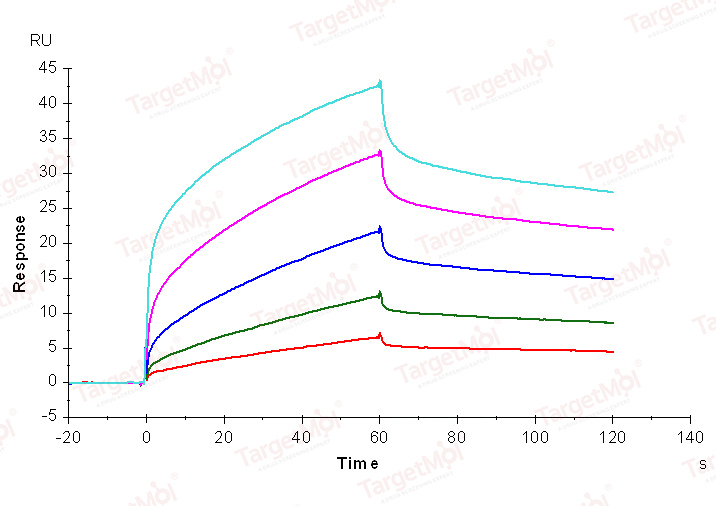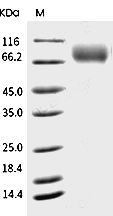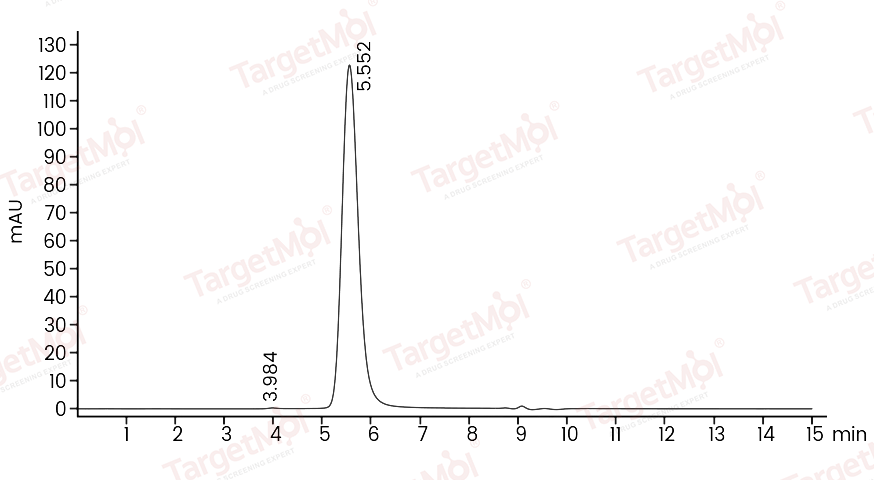Shopping Cart
- Remove All
 Your shopping cart is currently empty
Your shopping cart is currently empty
CSF1R Protein (Met1-Glu512), Human, Recombinant (His) is expressed in HEK293 mammalian cells with His tag. The predicted molecular weight is 56 kDa and the accession number is P07333-1.

| Pack Size | Price | Availability | Quantity |
|---|---|---|---|
| 100 μg | $228 | In Stock | |
| 200 μg | $405 | 7-10 days |
| Biological Activity | 1.Measured by its binding ability in a functional ELISA. Immobilized human CSF1R at 10 μg/mL (100 μl/well) can bind biotinylated human CSF-1 , The EC50 of biotinylated human CSF-1 is 8 ng/mL.
2.Captured M-CSF/CSF1 Protein, Human on proA Chip can bind CSF1R with an affinity constant of 0.1468 µM as determined in a SPR assay (Routinely tested).  |
| Description | CSF1R Protein (Met1-Glu512), Human, Recombinant (His) is expressed in HEK293 mammalian cells with His tag. The predicted molecular weight is 56 kDa and the accession number is P07333-1. |
| Species | Human |
| Expression System | HEK293 Cells |
| Tag | C-His |
| Accession Number | P07333-1 |
| Synonyms | M-CSF-R,MCSF Receptor,HDLS,FMS,FIM2,CSFR,CSF-1R,colony stimulating factor 1 receptor,C-FMS,CD115 |
| Construction | A DNA sequence encoding the extracellular domain (Met1-Glu512) of human CSF1R (NP_005202.2) was expressed with a C-terminal polyhistidine tag. Predicted N terminal: Ile 20 |
| Protein Purity | ≥ 98 % as determined by SDS-PAGE. ≥ 95 % as determined by SEC-HPLC.   |
| Molecular Weight | 56 kDa (predicted); 85-95 kDa (reducing condition, due to glycosylation) |
| Endotoxin | < 1.0 EU/μg of the protein as determined by the LAL method. |
| Formulation | Lyophilized from a solution filtered through a 0.22 μm filter, containing PBS, pH 7.4. Typically, a mixture containing 5% to 8% trehalose, mannitol, and 0.01% Tween 80 is incorporated as a protective agent before lyophilization. |
| Reconstitution | A Certificate of Analysis (CoA) containing reconstitution instructions is included with the products. Please refer to the CoA for detailed information. |
| Stability & Storage | It is recommended to store recombinant proteins at -20°C to -80°C for future use. Lyophilized powders can be stably stored for over 12 months, while liquid products can be stored for 6-12 months at -80°C. For reconstituted protein solutions, the solution can be stored at -20°C to -80°C for at least 3 months. Please avoid multiple freeze-thaw cycles and store products in aliquots. |
| Shipping | In general, Lyophilized powders are shipping with blue ice. |
| Research Background | M-CSFR encoded by the proto-oncogene c-fms is the receptor for colony stimulating factor 1 (CSF1R), a cytokine involved in the proliferation, differentiation, and activation of macrophages. This cell surface glycoprotein is consisted by an extracellular ligand-binding domain, a single membrane-spanning segment, and an intracellular tyrosine kinase domain. Binding of CSF1 activates the receptor kinase, leading to "autophosphorylation" of receptor subunits and the concomitant phosphorylation of a series of cellular proteins on tyrosine residues. CSF1R is a tyrosine kinase receptor that is absolutely required for macrophage differentiation and thus occupies a central role in hematopoiesis. CSF1 and its receptor (CSF1R, product of c-fms proto-oncogene) were initially implicated as essential for normal monocyte development as well as for trophoblastic implantation. This apparent role for CSF1/CSF1R in normal mammary gland development is very intriguing because this receptor/ligand pair has also been found to be important in the biology of breast cancer in which abnormal expression of CSF1 and its receptor correlates with tumor cell invasiveness and adverse clinical prognosis. Tumor cell expression of CSF1R is under the control of several steroid hormones (glucocorticoids and progestins) and the binding of several bHLH transcription factors, while tumor cell expression of CSF-1 appears to be regulated by other hormones, some of which are involved in normal lactogenic differentiation. However, studies have demonstrated that CSF1 and CSF1R have additional roles in mammary gland development during pregnancy and lactation. The role of CSF1 and CSF1R in normal and neoplastic mammary development that may elucidate potential relationships of growth factor-induced biological changes in the breast during pregnancy and tumor progression. |

Copyright © 2015-2025 TargetMol Chemicals Inc. All Rights Reserved.